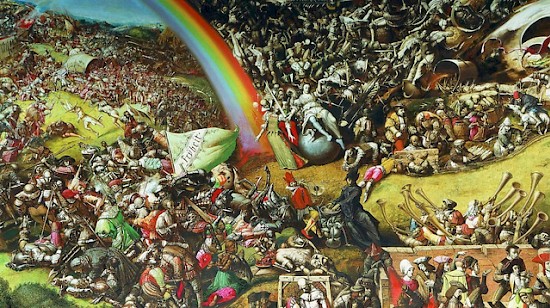The Battle of Frankenhausen
One of the key battles of the German Peasants’ Revolt took place in central town of Frankenhausen. That region had seen a large outbreak of violence, and in early May of 1525 various peasants groups started to gather at the town, including the radical preacher Thomas Müntzer. In response, the Landgrave Philip I of Hesse and Duke George of Saxony assembled an army of mostly mercenaries, and marched to Frankenhausen.

The battle took place on May 15, 1525. The following day Count Philipp von Solm wrote to his son, detailing what took place:
The peasants had drawn up their battle order before dawn on a high hill on the other side of the town; they had made a circle of wagons and had their good cannon with them. We marched into the open field on the other side. First, they fired over the town almost as far as us, but hit nothing. We remained there until mid-day, until our guns and horse were ready, and took counsel how to attack them. They had taken up a good position and it was decided in council that we should march around the town from both sides towards them.
Following good advice, we brought our guns up the slope so that they could fire into them, and attacked the nearest of them with horse and foot. They did not hold firm, but ran to seek the safety of the town. We gave pursuit and killed the majority of them between the hill and the town, but many got inside. We began to storm the town at once and conquered it speedily, and killed everyone caught there. Many of them were found in the drainage canal of the saltworks or else in the houses, and goodly numbers were not captured by the soldiers and horsemen until the evening, last night, and this morning, and their lives were spared.
The pastor of Allstedt, called Müntzer, was also captured. He had been the band’s preacher and leader and threatened count Ernst von Mansfeld, my son-in-law, and has always been rebellious. He was turned over to count Ernst by our gracious lord, the princes, to deal with him at his pleasure. He had him sent to Heldrungen within the hour and he will have received his just deserts there. Over five thousand peasants were slain and left for dead, others were captured as mentioned above, some are still in hiding, and others have escaped, but not many…
Less than two weeks later Thomas Müntzer would be tortured and executed. This excerpt is from The German Peasants’ War: A History in Documents, edited by Tom Scott and Bob Scribner. You can read more about the German Peasants’ Revolt in the latest issue of Medieval Warfare magazine.




